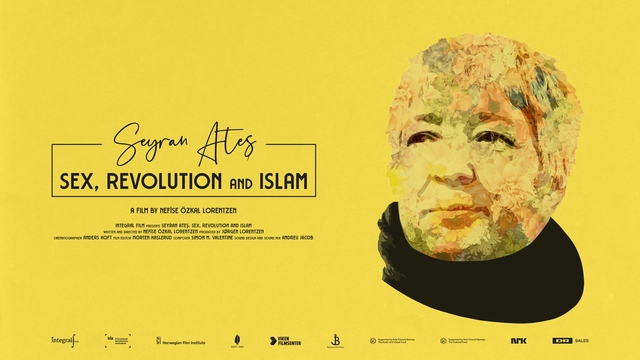The Producers

Nefise Özkal Lorentzen - Director
Nefise Özkal Lorentzen is a Turkish-Norwegian writer, filmmaker and producer living in Oslo. She received her B.A in Political Science at Bosphorus University in Istanbul and her M.A in Media and Communication at the University of Oslo. Over the past two decades she has produced and directed several controversial documentaries related to Islam. As a result of her dedication to LGBTQ people and human rights activism through her films, she's been named one of the TOP 10 immigrant role models in Norway. Her trilogy of films entitled, Gender Me (2008), A Balloon for Allah (2011), and ManIslam (2014), brings alive these untold stories through public visibility. Nefise has received several awards and nominations, and her films have premiered in several prestigious festivals such as the IDFA, the Rhode Island Film Festival, and the Göteborg Film Festival to just name a few. She was nominated for the History Makers Award in NYC. Utilizing her workshop concept, "gender activism through films", she has been cooperating with various NGOs, and hopes one day gender segregation and violence against women will be a long-forgotten aspect of history.
Making The Film

When I first heard about Seyran Ateş’ mixed-gender mosque in Berlin, I immediately decided to make a film about her life. However, it took me some time to penetrate through the fortifications of bodyguard protections, and the thick walls of media interest in her work. When Seyran watched my trilogy, she realized that we not only share the same goal, which is gender and sexual reformation in Islam, but we also share the same artistic vision in storytelling. Seyran is used to giving hundreds of interviews to TV and newspapers, but she has been eager to tell her story in a more creative way. When we found out that Carl Jung was one of our many common inspirations, Seyran gave me permission to tell her dreams, longings and sorrows.
“Gender” was the key concept in my quest into the mystery of Islam. The first documentary in the trilogy, Gender Me, about Islam and homosexuality, was released in 2008. The sequel, A Balloon for Allah, about women and Islam, followed in 2011 and the third instalment, Manislam, about the power, privileges and burdens of masculinity, was released in 2014. Through my “Jungian dreamwork” I have gotten full access to Seyran’s life. Seyran has seen the core of my art, which is transforming clichés into something unique. She has perceived how I have turned the cliché of 1001 Nights into 1002 Nights, to build the concept of dramaturgy for Gender me (homosexuality and Islam) and how I have used the cliché of Adam and Eve in A Balloon for Allah (women and Islam), as well as how I have expanded the story of David and Goliath in Manislam (masculinity and Islam) as a continuing element in the film.
As an artist I have been curious about searching for what is hidden behind the reality and how it is interpreted. My cinematographic vison seeks the thin organic lines between reality and memory. Seyran Ateş: Sex, Revolution and Islam is a portrait of a female imam and her struggles in activating sexual revolution within Islam. The way I want to portray her is to bring her into “our living room.” However, it is not easy for the audience to identify with one of the most police-protected civilian women in our time. Therefore, I choose to portray her as a daughter, sister, mother, aunt and also as a good friend.
As an independent filmmaker, I usually work on several projects in different phases at the same time. When I was developing the concept of Seyran’s film, I was also in post-production on another project called A Gift from God (2019), a critical documentary film which displays President Erdogan’s political strategy after the failed coup attempt. I co-directed the film together with Jørgen Lorentzen.
After we launched the film, my life changed. Similar to Seyran, I could no longer travel back to my beloved Turkey.
I understood Seyran’s longing through my heart, not only through my art or intellect. The film created a great deal of controversy, especially in Turkey. All the positive messages we have been receiving on social media have helped us to ignore the online threats and harassment coming from Erdogan’s followers.
If Seyran, a girl from the Turkish ghetto in Berlin, becomes the woman who can change the political narrative in Germany, then anyone could make changes in their community. Therefore, the film does not portray Seyran as an unreachable person, but as a woman who opens her heart and shares her struggles, fears, dreams, and the goals she is fighting to reach. It is not only conservative right-wing people who have created many hindrances for progressive Muslim women, but also left-wing intellectuals, who do not dare to take the problems within the Muslim communities seriously. The gender revolution within Islam is highly necessary. I really believe that our film on Seyran Ateş will trigger it.
- Nefise Özkal Lorentzen
 Follow Seyran Ateş, one of the first female imams in Europe, as she fights for a sexual revolution within Islam. Ateş believes that the only way to fight against radical Islam is through Islam itself. In her mosque, there is no gender segregation and all sexual orientations are welcome. But after being shot and threatened as a result of both her imam status and her beliefs, she now lives under constant police protection.
Follow Seyran Ateş, one of the first female imams in Europe, as she fights for a sexual revolution within Islam. Ateş believes that the only way to fight against radical Islam is through Islam itself. In her mosque, there is no gender segregation and all sexual orientations are welcome. But after being shot and threatened as a result of both her imam status and her beliefs, she now lives under constant police protection.







